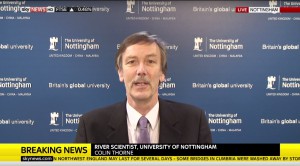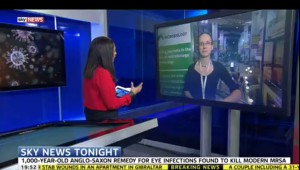May 3, 2016, by Liz Cass
Why working with the media can take your work in a whole new direction
When you’ve worked with the media for most of your career it can be easy to forget how daunting it can be for some to see their name in print, appear on camera or even speak to a journalist.
In my opinion, and heading up the Media Relations Office I am a little biased, the benefits of stepping out of your comfort zone and engaging with my team, and the media, are exponential.
This Thursday evening The University of Nottingham will host the Knowledge Exchange and Impact Awards and, for the first time, there will be two new awards which celebrate working in the media- both traditional and digital.
This is a big step forward in recognising the benefits of media work as well as a thank you to all those people who have been encouraged/corralled to go on camera, provide a quote for print, or tweet 140 characters to help promote our University in a positive way.
Working with the media is essential if, as a team, the University is to meet its strategic aims. We need to showcase our vision and how we are meeting it.
We need to show what we are doing to attract the best students, capturing their imaginations and developing their careers.
And if you need an example of why we need to showcase our research then I have one word for you- AncientBiotics.
Last year a story about a 19th-century translation of a medieval eye-infection recipe was found to be capable of killing off modern-day superbug MRSA.
The team at the centre of the research Dr Christina Lee and Dr Freya Harrison, who are on the awards shortlist, were ready to share this discovery with the media and what followed was one of the biggest news stories the University has ever had.
As well as the story going viral, with more than 1,300 items of coverage reaching more than 46 million people, the team was contacted by journals asking to publish the findings and offers of funding.
People sometimes believe that having their work recognised by their fellow academics is enough.
But put this on a global platform and you’re opening yourself up to more citations, funding sources, a reputation as an expert in your field, collaborations and even more engaged students who get a reminder of the value of their research. Think about what you want to achieve and talk to us if you think we can help.

Be an expert
Every day in the Media Relations Team we have requests from journalists and broadcasters who are looking for academic expertise on a host of topics.
If you watch the news and can see how your research or area of expertise could be used to provide a comment on the issue of the day then we want to hear from you.
Shortlisted media awards candidates Michele Geraci, Prof Steve Tsang, Prof Colin Thorne and Prof Jonathan Ball are all masters at this because they can apply their expertise to the news agenda.
And sometimes stepping into the media forum can also lead to other kinds of work- international documentaries (take a bow Associate Prof Jon Henderson) or appearances on Countryfile. The opportunities are endless.
We had more than 50 entries for the two awards and the standard was so high it was hard work choosing a winner.
But for all those who entered and to all those who agree to do a ‘quick’ radio interview, send an email with some quotes on it or share the next big story with my team – please know how grateful we are.
Thank you for stepping out of your comfort zone (before realising media work can actually be fun) and for helping us spread the word about the great work the University is doing.
The winners of the Knowledge Exchange and Impact Awards 2016 will be shared on social media on Thursday 5 May 2016 and on The University of Nottingham website on Friday 6 May 2016.
If you want to find out more about working with the media contact us.
No comments yet, fill out a comment to be the first


Leave a Reply